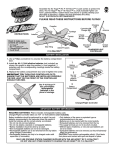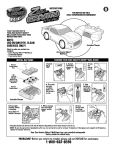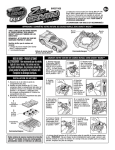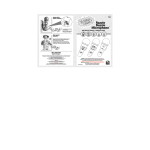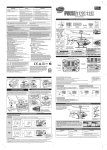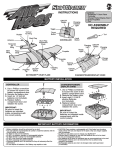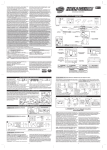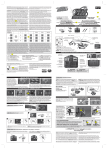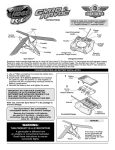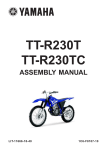Download Spin Master Havoc Stinger Motorized Toy Car User Manual
Transcript
Problems flying? Do not return your Air Hogs® to the store. Call the Air Hogs® flight training center at ® TM 1-800-622-8339 CONTENTS LIST AND PARTS IDENTIFICATION Havoc Stinger™ Controller/Charger HAVOC STINGER™ Caution: Spare Tail Propeller Aluminum labels Stabilizer Spare tail propeller only to be replaced by an adult. Instruction Manual Power switch Connecting shaft CHG 1 ON OFF Charging socket Main rotor blade Optional aluminum labels Tail rotor 2 Stick the aluminum label here to obtain different performance. Driving gear Landing gear Do not touch the running propeller! Do not play above someone’s head! Adult supervision is required! WARNING: CHOKING HAZARD Small parts. Not for Children under 3 years. DANGER! DO NOT PUNCTURE THE STYROFOAM! THE BATTERY WILL BE DAMAGED. BECOMING FAMILIAR WITH YOUR CONTROLLER/CHARGER CONTROLLER/CHARGER Power indicator Power switch Throttle stick (UP DOWN) Band selector Minimum Throttle position Direction stick (LEFT/RIGHT) Trimmer Charging indicator Cover and charging wire Battery cover HOW TO INSTALL YOUR BATTERIES BATTERY INSTALLATION – CONTROLLER/CHARGER 1. Use a Phillips head (Cross-Head) screwdriver to loosen the screws on the battery case anti-clockwise (pic.1). 2. Put 6 AA size batteries in the battery compartment as per the polarity shown inside (pic.2). 3. Tighten the screw in clockwise (pic.3). pic.1 pic.3 pic.2 HOW TO CHARGE YOUR HAVOC STINGER™ STEP ONE Pull out the cover and take out the charging wire. STEP TWO STEP THREE Turn off the power to the helicopter located on the side of the helicopter. Insert the charge plug into the socket on the side of the helicopter. ON CHG STEP FOUR The green LED will light up when charging. Once completed it will turn OFF. Pull the plug out from the side of the helicopter. OFF Things to remember: 1. The helicopter will have 5-6 minutes of flight time after a 20-30 minute charge. 2. Before you recharge the battery, wait 10-15 minutes to let the battery cool down. HOW TO FLY YOUR HAVOC STINGER™ 1. SET THE BAND ON YOUR CONTROLLER: To do this, you must check which frequency letter your helicopter is set at. Turn over the helicopter and you will find a letter (A,B,C) on the bottom. Set the band selector on your controller to the same letter by moving the horizontal switch. 2. TRIMMING YOUR HELICOPTER: STEP ONE Gently push the throttle up to raise your helicopter 1.5 ft to 3.25 ft high off the ground. If your helicopter turns CLOCKWISE, continue to push the LEFT side of the trim REPEATEDLY until the turning stops and the helicopter flies straight. STEP TWO or Spiral clockwise Keep turning clockwise If your helicopter turns COUNTER CLOCKWISE, continue to push the RIGHT side of the trim REPEATEDLY until the turning stops and the helicopter flies straight. STEP THREE or Spiral counter clockwise Keep turning counter clockwise 3. CHOOSE AN IDEAL FLIGHT ENVIRONMENT NOTE: Your Havoc Stinger™ loses its trim EVERY time you turn it off. So remember these helpful tips to stabilize it every time! Choose the place which meets the following conditions: 1. Indoor environment with calm air-condition. Beware of the air circulation from the air-conditioner. 2. Space area: It is recommended to have space area over 10 ft (W) x 16.5 ft (L) x 8 ft (H). 3. Safety area: It is highly recommended that there is no electric fan, air-conditioner, reading lamp or other dangerous objects to flying. 3. FLIGHT CONTROL (After Trimming) - Put the helicopter on a smooth surface. Uneven floor surface will affect its lifting off. - Slowly increase the throttle. - DO NOT look at the controller/charger but focus on the helicopter. - As soon as the helicopter leaves ground, reduce the throttle slightly. (in the worst case, the helicopter will drop back to the floor, but that is better than crashing against the ceiling) - VERY gently add the throttle if the helicopter goes down. - VERY gently reduce the throttle if helicopter goes up. - For turning, give short and small inputs to the direction stick. (Most beginners will easily over control the helicopter) NOTE: Hovering is half the battle. If you can maintain your helicopter in a stable position in the air you are on your way to becoming a PRO. Hover up and down: Turn counter clockwise and clockwise: When the helicopter flies steadily, you can slowly push the throttle stick up to make helicopter fly higher, or release the stick a bit to make helicopter fly lower. Only small amounts of stick position change are required for smooth flying (Pic.4 & Pic.5). Hold the helicopter at a height. Push the rudder stick toward left to turn counter clockwise (pic.6), and push the rudder stick toward right to turn clockwise (pic.7). Hover up Hover down pic.4 pic.6 pic.5 pic.7 Accelerates & Decelerates: Fly forward and stop: If you turn the helicopter slowly to the counter clockwise, the helicopter will decelerate. And when turned it to the clockwise, it will accelerate. The helicopter will take a slow forward speed when a gentle Clockwise turn is made. To make it stop, it is sufficient to give a short Counter clockwise turn command. By alternating this flight technique, the helicopter can be directed anywhere and come back to it’s starting position. HOW TO ADJUST YOUR HELI’S FLIGHT PERFORMANCE FORWARD WEIGHTING If you would like to adjust the directional control of your Havoc Stinger™, you have the option of putting on the Optional Aluminum Labels. Stick one label on the bottom of the helicopter’s nose as needed. These will forward weight the helicopter and allow for a different flight performance. Optional aluminum labels Stick the aluminum label here to obtain different performance. HOW TO FIX YOUR TWIN ROTORS If the linkage between your twin rotors comes undone and is dangling below the bottom rotor, it is very EASY to fix! (A) Carefully re-attach the linkage back onto the top connector and gently push it into place. (B) While your there, you might want to check around the area for any fibers or debris that might affect your flight performance. Carefully remove it with tweezers and you are ready to start flying again! A B WRONG RIGHT TROUBLESHOOTING PROBLEM Main rotor won’t move. Tail rotor is broken or not moving. Suddenly stops and drops while flying. CAUSE SOLUTION ON/OFF switch is set to OFF. Set switch to ON. Weak battery. Re-charge the helicopter using the charging port OR check batteries in the controller. Something may be caught in the rotor. Remove blockage. Rotor may have chipped during flight. Try stearing left/right to activate tail rotor. Replace tail rotor with the spare set in the package. Weak power. Re-charge helicopter or check battery power in controller. Helicopter may be out of range from controller. TROUBLESHOOTING Cont’d PROBLEM The Helicopter is not reacting to the controller. CAUSE SOLUTION A,B,C channel selection on controller is not correct. Double check the letter on the bottom of the helicopter and adjust the channel selector on the controller. Helicopter may not be turned ON. Turn helicopter ON. May be another infrared (IR) device using the same channel. Avoid these if possible, or choose another place to operate the helicopter. Bright lights may be affecting the IR control. Turn down lights or change flight environment. You may be too far away from the controller. Stay closer to the helicopter with the controller. Helicopter might be turned ON while charging. Turn OFF the helicopter so that it is not flashing. Controller/charger is low on battery power. Replace batteries in the controller. Helicopter will not lift off the ground. Helicopter may not be fully charged. Charge helicopter fully, until green light turns off. Helicopter only turns in one direction. Helicopter is not trimmed correctly. Refer to the TRIMMING section in the instruction sheet. Helicopter will not move forward or backwards. Helicopter may not be properly weighted. Apply a silver aluminum sticker (included in box) to the nose of the helicopter. Helicopter is losing control. Helicopter is not holding a charge. NOTE: Helicopter only moves forward and sideways. For further questions and problems, please visit our website www.airhogs.com. Safety Precautions: Warning: Changes or modifications to this unit not expressly approved by the party responsible for compliance could void the user's authority to operate the equipment. - Keep hands, hair and loose clothing away from the propeller when power switch is turned ON. - Turn off controller/charger and helicopter when not in use - Remove battery from controller/charger when not in use. - Parental guidance is recommended for the flight. - Keep your helicopter in your sight so that you can supervise it all the time. - New and alkaline batteries are recommended for use in controller/charger to obtain best and maximum performance. - You are advised to replace with new batteries as soon as the function becomes impaired. - Users should keep and retain this information for future reference. - Users should keep strict accordance with the instruction manual while operation the product. - Your controller/charger is tailor-made for the Li-Poly rechargeable battery used in Havoc Stinger™. Do not use it to charge any battery other than that in the helicopter. FCC Statements This device complies with part 15 of the FCC rules. Operation is subject to the following two conditions: 1)This device may not cause harmful interference, and 2)This device must accept any interference received, including interference that may cause undesired operation. NOTE: This equipment has been tested and found to comply with the limits for a Class B digital device, pursuant to Part 15 of the FCC Rules. These limits are designed to provide reasonable protection against harmful interference in a residential installation. This equipment generates, uses and can radiate radio frequency energy and, if not installed and used in accordance with the instructions, may cause harmful interference to radio communications. However, there is no guarantee that interference will not occur in a particular installation. If this equipment does cause harmful interference to radio or television reception, which can be determined by turning the equipment off and on, the user is encouraged to try to correct the interference by one or more of the following measures: - Reorient or relocate the receiving antenna. - Increase the separation between the equipment and receiver. - Connect the equipment into an outlet on a circuit different from that to which the receiver is connected. - Consult the dealer or an experienced radio/TV technician for help. Care and Maintenance: - Always remove batteries from the toy when it is not being used for a long period of time. (controller/charger only) - Wipe the toy gently with a clean damp cloth. - Keep the toy away from direct heat. - Do not submerge the toy into water that can damage the electronic assemblies. Battery Cautions: - Non-rechargeable batteries are not to be recharged - Rechargeable batteries are to be removed from the toy before being charged (controller/charger only). - Rechargeable batteries are only to be charged by an adult - Different types of batteries or new and used batteries are not to be mixed (controller/charger only). - Only batteries of the same or equivalent type as recommended are to be used. - Batteries are to be inserted with correct polarity. - Exhausted batteries are to be removed from the toy (controller/charger only). - The supply terminals are not to be short-circuited. Helicopter is equipped with a Li-Poly rechargeable battery, please also pay attention to the following cautions for safety use: - Do not dispose the battery in fire or heat. - Do not use or leave the battery near a heat source such as fire or heater. - Do not strike or throw the battery against hard surface. - Do not immerse the battery in water, and keep the battery in a cool dry environment. - When recharging, only use the battery charger specifically for that purpose. - Do not over-discharge the battery. - Do not connect the battery to an electrical outlet. - Do not directly solder the battery and pierce the battery with a nail or other sharp object. - Do not transport or store the battery together with metal objects such as necklaces, hairpins etc. - Do not disassemble or alter the battery. - Charge the battery every 6 months. - Turn off your equipment power switch after use. - As for a used battery, please recycle after covering the battery terminals with insulation tape or inserting it to an individual poly-bag. Spin Master Ltd., 450 Front Street West, Toronto, ON M5V 1B6 Canada Spin Master Inc., PMB #10053, 300 International Drive, Suite 100, Williamsville, NY 14221, USA Spin Master Toys Far East Limited. Rm #1113, 11/F, Chinachem Golden Plaza, 77 Mody Rd., Tsimshatsui E., Kowloon, HK Spin Master Toys UK Ltd., Meadowbank, Furlong Road, Bourne End, Bucks, SL8 5AJ, United Kingdom Spin Master France – 36 rue de Silly – 92100 Boulogne Billancourt – France North American Consumer Information Phone: 1-800-622-8339 www.spinmaster.com Note: - Parental guidance is recommended when installing or replacing batteries. - Under the environment with electrostatic discharge, the sample may malfunction and require user to reset the sample. Special Note to Adults: - Regularly examine for damage to the plug, enclosure and other parts. In the event of any damage, the toy must not be used with the controller/charger charger until the damage has been repaired. - This toy is not intended for children under 3 years old. - This toy must only be used with the recommended charger - Do not try to charge other batteries with controller/charger. Battery requirement for Havoc Stinger™: Power Supply : Rating : DC 3.7 V, 1,8 W Batteries : 1 x 3.7 V Li-Poly Rechargeable Battery Pack Requires 1 x 3.7 V Li-Poly Rechargeable Battery Pack (included) Battery requirement for Controller/charger: Power Supply : Rating : DC 9 V, 0,45 W Batteries : 6 x 1.5 V "AA"/LR6/AM3 Requires 6 x 1.5 V "AA" size batteries (not included) TM and © 2007 Spin Master Ltd. Air Hogs ® is a registered trademark of Spin Master Ltd. All rights reserved. Conforms to product safety standards ASTM F963, EN71 regulatory requirements. Products and colors may vary. Please retain this information for future reference. Patent Pending. MADE IN CHINA. TM #20010685 NEN REV 2






